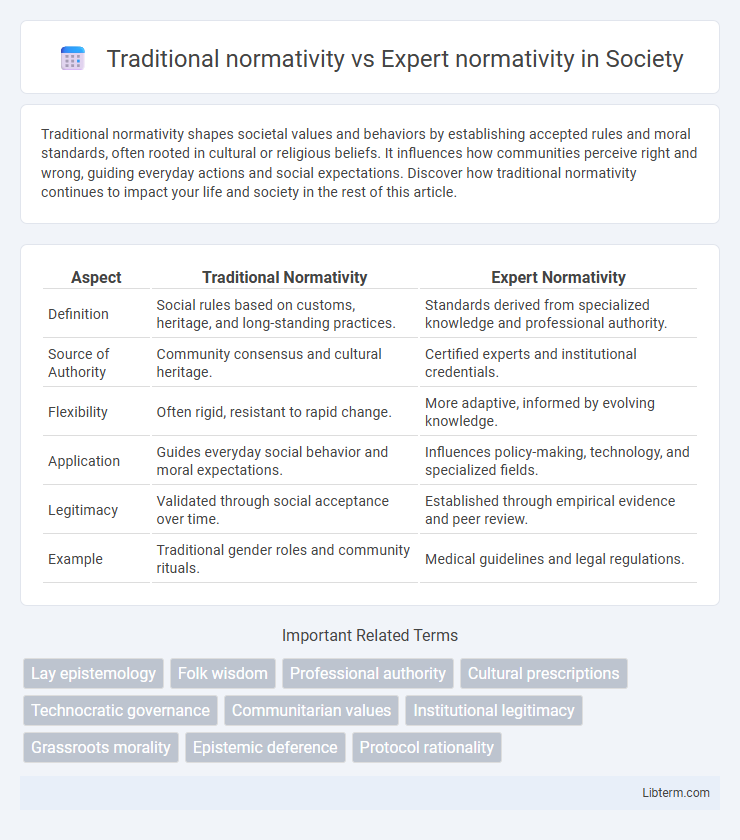Traditional normativity shapes societal values and behaviors by establishing accepted rules and moral standards, often rooted in cultural or religious beliefs. It influences how communities perceive right and wrong, guiding everyday actions and social expectations. Discover how traditional normativity continues to impact your life and society in the rest of this article.
Table of Comparison
| Aspect | Traditional Normativity | Expert Normativity |
|---|---|---|
| Definition | Social rules based on customs, heritage, and long-standing practices. | Standards derived from specialized knowledge and professional authority. |
| Source of Authority | Community consensus and cultural heritage. | Certified experts and institutional credentials. |
| Flexibility | Often rigid, resistant to rapid change. | More adaptive, informed by evolving knowledge. |
| Application | Guides everyday social behavior and moral expectations. | Influences policy-making, technology, and specialized fields. |
| Legitimacy | Validated through social acceptance over time. | Established through empirical evidence and peer review. |
| Example | Traditional gender roles and community rituals. | Medical guidelines and legal regulations. |
Defining Traditional Normativity
Traditional normativity refers to moral and social rules inherited through cultural customs and communal practices, shaping behavior based on longstanding societal conventions. It emphasizes collective wisdom and shared values passed down across generations, often grounded in religion, folklore, and historical precedent. This form of normativity contrasts with expert normativity by relying more on communal consensus than specialized knowledge or scientific authority.
Understanding Expert Normativity
Expert normativity centers on the authority of specialized knowledge and skills established through rigorous education, training, and empirical validation. It shapes decision-making processes by relying on evidence-based standards and domain-specific expertise, distinguishing it from traditional normativity, which is rooted in cultural customs and inherited practices. This framework enhances precision and adaptability in complex environments, driving innovation and informed judgments across various professional fields.
Historical Roots of Normative Systems
Traditional normativity originates from long-established customs and communal practices deeply embedded in cultural heritage, often transmitted orally across generations. Expert normativity, by contrast, emerges from specialized knowledge systems developed through formal education and professional training, reflecting institutionalized standards and scientific methodologies. The historical roots of these normative systems highlight a shift from community-based rule-making toward epistemic authority grounded in expertise and systematic inquiry.
Authority Sources: Tradition vs Expertise
Traditional normativity derives authority from long-standing customs and societal practices rooted in historical continuity. Expert normativity bases its authority on specialized knowledge, empirical evidence, and professional consensus within a given field. While tradition relies on inherited legitimacy, expert normativity prioritizes rational justification and updated understanding.
Cultural Influence on Normative Beliefs
Traditional normativity is deeply rooted in cultural heritage and social practices, shaping normative beliefs through shared values and collective identity. Expert normativity relies on specialized knowledge and scientific frameworks, often challenging or refining cultural norms with evidence-based standards. The interplay between cultural influence and expert input creates dynamic normative landscapes where tradition and modern expertise continuously negotiate social expectations.
Trust and Legitimacy in Norm Formation
Traditional normativity relies on communal trust and shared values that evolve over time, grounding legitimacy in collective acceptance and cultural continuity. Expert normativity derives legitimacy from specialized knowledge and empirical evidence, fostering trust through credibility, expertise, and demonstrable outcomes. Trust in traditional norms stems from historical validation, while expert norms build legitimacy by aligning with rational justification and institutional authority.
Adaptability of Traditional vs Expert Norms
Traditional normativity relies on established customs and long-standing practices, exhibiting limited adaptability due to its deep roots in cultural continuity and social cohesion. Expert normativity, grounded in specialized knowledge and empirical evidence, demonstrates greater flexibility, allowing norms to evolve dynamically in response to new information and complex problems. This adaptability enhances the relevance and effectiveness of expert norms in rapidly changing environments, contrasting with the more static nature of traditional norms.
Conflicts Between Custom and Expertise
Conflicts between traditional normativity and expert normativity arise when long-standing customs clash with specialized knowledge or scientific findings. Traditional norms derive authority from historical and cultural continuity, while expert norms gain legitimacy through empirical evidence and professional consensus. These conflicts often manifest in public policy debates, healthcare decisions, and environmental regulations, where resistance to change challenges expert recommendations despite their basis in advanced research.
Societal Outcomes of Competing Normativities
Traditional normativity, rooted in cultural practices and communal values, often fosters social cohesion and preserves identity by reinforcing established behavioral expectations. Expert normativity, driven by specialized knowledge and scientific evidence, can enhance societal outcomes by promoting innovation, efficiency, and policy decisions based on empirical data. The tension between these normativities shapes societal progress, where balancing respect for cultural traditions with adoption of expert guidance influences governance, social trust, and the collective capacity to address complex challenges.
Navigating the Future: Integrating Tradition and Expertise
Navigating the future requires a balanced integration of traditional normativity, which emphasizes established cultural values and collective wisdom, with expert normativity that relies on specialized knowledge and evidence-based decision-making. This synergy allows societies to honor historical contexts while adapting to innovations and complex challenges through informed, ethical frameworks. Embracing both perspectives fosters resilient governance and sustainable progress in rapidly evolving environments.
Traditional normativity Infographic

 libterm.com
libterm.com